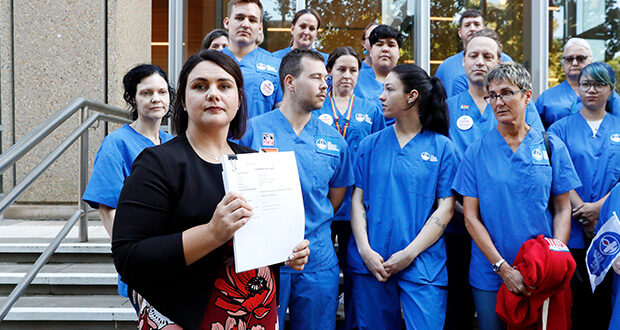Plans announced today in the government’s 2023 spring budget have been labelled “disappointing” by health leaders as they contain no further information about the upcoming NHS workforce plan.
Chancellor of the exchequer, Jeremy Hunt, has been told by those working in the health service that he missed an opportunity to provide clarity about the NHS workforce plan, and that there must be “no more delays” on the details.
“The lack of the long-promised fully funded workforce plan for the NHS continues to delay meaningful action”
Sally Gainsbury
In a statement made this afternoon Mr Hunt announced details of the 2023 budget, which he claimed would “tackle labour shortages” and “break down barriers that stop people working”.
One key measure that was announced today included a promise of 30 hours of free childcare for working parents in England being expanded to cover one and two-year olds.
Mr Hunt said that for many women, having a career break to look after young children had become “a career end” and that this reform would “transform the lives of thousands of women” who want to return to work.
Meanwhile, the chancellor also outlined a series of pension reforms, including increasing the tax-free yearly allowance for pensions from £40,000 to £60,000 and abolishing the lifetime cap on tax-free pension contributions.
Government subsidies which limit the typical household energy bills to £2,500 a year were also extended for another three months as part of the announcements today.
However, nursing and other heath leaders have raised concerns about the lack of focus in the budget on the NHS workforce crisis.
Today, Mr Hunt said that the government “will shortly publish the long-term workforce plan” he promised in the autumn budget last year, however he gave no further details about when that may be.
The plan is set to include verified forecasts for the number of doctors, nurses and other professionals that will be needed in five, 10 and 15 years’ time.
Responding to the announcements today, the Royal College of Nursing (RCN) director for England, Patricia Marquis, warned that England’s health and social care system was “ailing” and the budget “did not put it on a better path”.
Ms Marquis noted that when he was chair of the Health and Social Care Select committee last year, Mr Hunt was “raising the alarm over the greatest workforce crisis in NHS history” but since being appointed as chancellor he was “not yet gripping it”.
She added: “Without staff, the NHS cannot plan for recovery in patient and public services – yet there was only a passing reference to the long-awaited workforce plan.
“The chancellor will know ill health and NHS waiting lists are a primary driver of economic inactivity.
“Only by investing in the NHS and those who keep it running, will we have a healthy population to boost the economy.”
Members of health unions, including the RCN, have been on strike in recent months over pay for NHS staff, as well as safe staffing.
Currently these unions are in pay negotiations with the health and social care secretary, Steve Barclay, to try and resolve the ongoing dispute.
Patricia Marquis
However, Trade Union Congress general secretary, Paul Nowak, noted that the chancellor “did nothing” in the budget to improve wages of key workers.
He said: “There is no plan to get wages rising across the economy.
“And the elephant in the room is the lack of funding for our public services and the pay rises needed to recruit and retain nurses, carers and teachers.”
Mr Nowak also called for publication of a fully-funded workforce plan across public services “to recruit and retain key workers”.
Nuffield Trust senior policy analyst, Sally Gainsbury, also called on the government to publish the workforce plan.
She said: “The chancellor made this a budget about boosting the workforce across the economy, but the lack of the long-promised fully funded workforce plan for the NHS continues to delay meaningful action.
“The government remains silent on any funding to shore up a social care workforce eroded to near collapse.”
Chief executive of NHS Providers, Sir Julian Hartley, echoed these sentiments.

Julian Hartley
Although he welcomed some of the pension reforms outlined today and the positive impact these may have on senior NHS staff, Sir Julian warned that these were “only one part of the puzzle”.
He also noted that NHS trusts were facing strike action due to “widespread dissatisfaction with pay and conditions” and staff shortages.
Sir Julian said: “It was disappointing that the chancellor didn’t announce further detail on the long awaited fully funded, long-term national workforce plan which the NHS so desperately needs.
“We will hold him to his word on publishing the plan shortly, in the expectation that it will be appropriately detailed, with staff numbers, costs and funding to match.
“There must be no more delays.”







